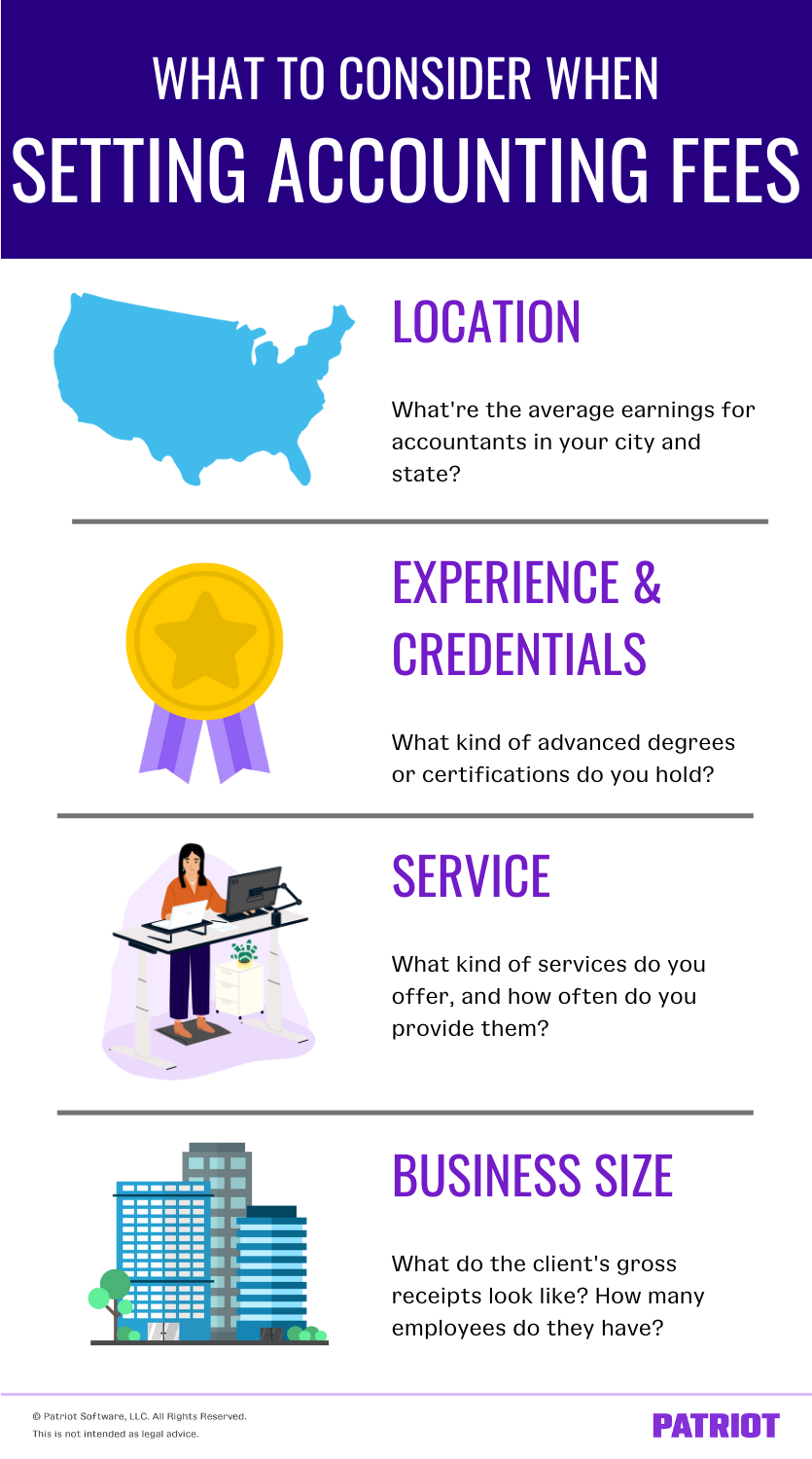Setting your accounting service rates for the first time or updating them? Either way, you might be wondering: How much do accountants charge?
Setting a reasonable and competitive price is key to sourcing and retaining clients, after all. Overpricing your services may send clients running for the hills (or into the arms of a competing accountant). But on the flip side, drastically underpricing your services jeopardizes your bottom line and sells yourself short.
Long story short, deciding on your accounting service fees requires a balancing act. Read on to learn:
- How do accountants charge?
- How much do accountants charge on average?
- 4 Factors to consider when setting your accounting fees
- Quick fee-setting tips
How do accountants charge?
First things first: Average accountant rates and earnings depend on how you charge your clients. So, how do accountants charge?
You may decide to use one or more of the following pricing structures:
- Hourly rate: You charge clients by the hour for your services (earnings vary based on how much time you spend).
- Salary: You receive a salary as an in-house accountant or from your accounting firm.
- Fixed-rate pricing: You have clients pay a fixed amount up front (e.g., per month or per project, etc.)
- Percentage of client’s income: You charge clients a fee based on a percentage of their revenue.
Before deciding which pricing structure you want to use, consider factors like whether your services are ongoing and how much time you spend with each client.
How much do accounts charge on average?
As an accountant, you’re probably asking yourself: How much should I charge for accounting services? Again, that all depends on a number of factors (which we’ll get to below). But, you might want to know what other accountants charge.
So, how much do accountants charge per hour on average? How much is the average salary for an accountant? Again, the average amount an accountant charges depends on their pricing structure.
To help you get a feel for average accounting fees, here are some numbers:
As you can see, professional fees in accounting can vary widely, depending on a number of factors…
4 Factors to consider when setting your accounting fees
Looking at average accounting fees is a great starting point, but there’s more that goes into setting your pricing than national averages. You also need to consider factors that directly impact your accounting services cost.
To avoid overpricing and underpricing your services, take a look at the following four factors.

1. Location
Ah, location, location, location. Your accounting firm location (and where clients are located) plays a role in accounting fee averages.
If you offer virtual services to clients, consider their location and whether you need to adjust your fees accordingly.
Want to learn more about location and your fees? Do some research to see the highest paying cities and states for accountants. For example, Indeed reports that accountants in Houston, Texas earn an average of $71,176 per year compared to $55,232 in Los Angeles, CA.
2. Experience and credentials
How long have you been an accountant? What types of credentials (e.g., education and certifications) do you have? Consider your experience and credentials when setting your fees.
The longer you’ve been an accountant, the more clients you’ve had, the more work you’ve done, and the more tricky tax situations you’ve seen. As a result, you may charge more.
Your clients may also be willing to pay more if you have advanced degrees and certifications.
For example, you might charge more because of education and certifications like:
- Certified Public Accountant (CPA)
- Master’s degree
- Certified Fraud Examiner (CFE)
- Certified Management Accountant (CMA)
When marketing your accounting firm, remember to show off your experience and credentials to build trust and credibility.
3. Service
The types of services you offer—and how frequently you offer them—can heavily influence how much you charge.
For example, take a look at how average accounting fees vary by the type of service:
- Tax preparation costs an average of $150 – $350
- Balancing books costs an average of $200 – $400
- Preparing financial statements costs an average of $250 – $500
So, what types of services do you and your firm offer? In-demand accounting services for small businesses include business formation, tax planning and consulting, auditing, bookkeeping, payroll, and advising. The more complicated the service, the more you might decide to charge.
Also, consider the timing at which you offer services. Will you charge more if clients ask for services at the last minute?
Last but not least, how often a client receives services could influence pricing. For example, you can charge frequent clients a lower rate than one-time clients.
4. Business size
How complex is a prospective or current client’s situation? The larger the client’s business, the more you may need to charge.
When it comes to business size and your accounting fees, consider:
You might decide to create tiers for small, medium, and large business clients. For example, you would charge a business with more than 100 employees more to run payroll than a small business with five employees.
Quick fee-setting tips
When it comes to setting your professional fees in accounting, there are a number of factors that come into play. It’s not a one-size-fits-all approach.
Although we’re here to bring you some quick fee-setting tips, the process itself probably won’t be lightning fast. Go ahead and take your time setting your prices to ensure you bill clients fairly.
To set fair and reasonable accounting fees, you should:
- Research average accounting rates
- Consider location, experience, services you offer, and business size
- Look at your competitors’ prices
- Gather feedback from target clients
- Decide your pricing strategy (e.g., hourly rate, fixed rate, etc.)
After you decide your pricing, be ready to sell your services. You may consider offering a free consultation to talk with prospective clients and highlight the value you can provide, such as saving time and avoiding expensive mistakes.
This is not intended as legal advice; for more information, please click here.



